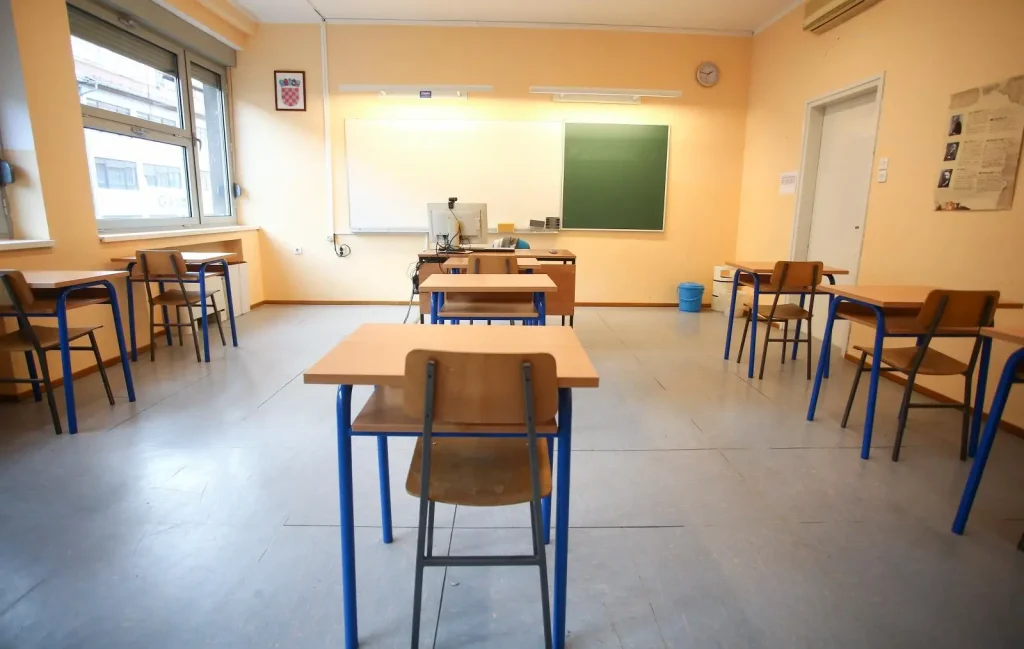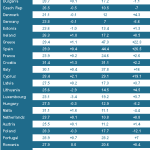September 10, 2023 – Some alarming trends in children numbers in Croatia, and analysis of Croatia’s ongoing demographic crisis, reports Mateja Celabija on Index.hr.
A fall in the number of children born is a demographic trend that has not been bypassing Croatia for the last ten years. Thus, six thousand fewer children were born in 2022 than in 2013, and last year alone, compared to the previous year, even three thousand fewer were born.
In 2021, 36,508 children were born, and that number dropped sharply the following year by over seven percent. In 2022, 33,883 children were born, so over two thousand less. By the end of July this year, 18,480 children were born.
Young people are getting married less often and later, women are giving birth later
Professor Vera Graovac Matassi, from the University of Zadar, points out the trend of a decrease in the population of fertile age as one of the key reasons for the decrease in the number of children, because women are giving birth later and later, thus reducing their reproductive age. All this, he explains, is a consequence of the modern age.
“Today, people are more and more focused on themselves, individualism; they want to afford trips and everything they want. That is why children are born at a later age, and in the end, there are fewer of them due to the reduced reproductive period of mothers. In Croatia today, women give birth on average between the ages of 31 and 34.

If we look at the last ten years of emigration, mostly the population between the ages of 20 and 40, i.e. those of reproductive age, emigrated. After joining the European Union, entire families emigrated, which reduced the number of young people and children,” explains Graovac Matassi.
Although the number of live births has decreased in the last ten years, the average number of children born to a woman does not deviate too much, explains Graovac Matassi. “A woman in Croatia has 1.5 children on average, and that average does not change significantly. Otherwise, the demographic theory says that in order for the population to renew itself, every woman of reproductive age should give birth to 2.1 children.
Therefore, more than two children per woman are needed in order for this renewal to proceed naturally. After all, the situation is the same in other European countries, where only a few countries meet this average, while most countries are below it. For example, France has the highest fertility rate in the European Union with an average of 1.8 children per woman,” says the professor.
What consequences will Croatia have due to the drastic drop in the number of children?
The last population census from two years ago showed all the demographic problems of Croatia. In addition to a drastic loss of population of up to 10 percent, an increase in the number of completely evicted places, there is also the age of the Croats. According to the latest Census data, the majority of people aged 65 and over live in Croatia, who make up 22.45 percent of the total population, and residents aged between 50 and 64 (21.38 percent of the total population). There are only 14.27 percent of children under the age of 14.
Professor Graovac Matassi explains that this trend will continue and that our descendants will have fewer children. “This decline is already reflected because, if today we have such a small number of children, in twenty years these children will enter the fertile age and there will be very few of them. It is not certain that one woman will give birth to five children then, but this trend that we have today will probably continue.
Fewer children in the future means a weaker reproductive potential and a shortage of labor, which we already feel to some extent. As for families, we will have fewer and fewer people, if there is no large immigration, which I don’t know how possible,” he says.
He points out that today young families are faced with high real estate prices and the impossibility of finding an affordable apartment for rent. He says that child support costs, like all others, have increased significantly, which is why there are calculations, which is why partners decide to have fewer children.
“Simply put, the lack of children born affects all aspects of demographic development. From decade to decade, we have more and more population over 65 years old. For example, in the 60s there were about seven percent of them, and today they are about 23 percent, which means that almost every fourth inhabitant of Croatia is 65 or older,” says Graovac Matassi.
This year, the number of first-graders enrolled in schools has dropped again
The new school year started on Monday. Students are still being registered in the registers, so their exact number is not yet known, but, according to the Ministry’s estimates, it will be smaller than in previous years. “According to estimates, about 35,000 students will attend the first grades of primary schools. We will have accurate data only when schools enroll students in the e-registry database, i.e. by September 30. From September 1st, students of the first grades are registered in the e-registry database, then the new school year opens in the database”, the Ministry told Index.

Looking at the statistics on the Ministry’s School e-mine page, in comparison between 2015 and 2022, even six thousand fewer children were enrolled in Croatian schools, and this number, according to the Ministry’s estimation, will continue this school year.
Sociologist: It is almost impossible for young people in Croatia to secure real estate
Economic sociologist Zdenka Damjanić says that the reduction in the number of newborns is such a significant phenomenon that demographers persistently indicate. She says that the reasons are multi-layered, but she still points out several aspects, of which, according to her claims, the key ones are bad economic conditions, the difficult solution to the problem of buying real estate, but also the state that does not build apartments for young families with affordable rents.
“Young people in Croatia generally marry later or do not marry because they do not have the economic conditions to start a family. This refers to the fact that incomes in Croatia are lower than in European countries. Another reason is the unresolved housing situation.
Croatia does not have housing associations for young people, it does not encourage housing construction for rent that would be affordable for young people, and this is now clearly visible. In this inflation, the biggest item is the increase in the price of a residential square meter and the increase in the price of rent.
With the fact that the Croatian government further encouraged this with POS apartments, the construction of which part of which comes from the state budget, thus enabling companies to build a larger number of housing units with guaranteed high prices per square meter of the apartment. At the same time, only creditworthy people can buy these apartments, most of whom do not belong to that category,” says Damjanić.
“Young people in Croatia today make ends meet. The state doesn’t care about that. Some regions don’t even have a pediatrician”
As a very important aspect, Damjanić cites the migration of young couples who move abroad with their children, because in Croatia “they cannot make ends meet because only one salary covers the loan installment, which, in Croatia compared to the rest of the EU, is significantly lower”.
“Salaries in Croatia, compared to the countries of the European Union, are too low and cannot provide the basic necessities of life for young people. These needs include housing, food and raising children. In the self-governing socialism before the 90s, companies set aside money for housing construction, wages were not high compared to those abroad, but there were many other aspects that facilitated and enabled people to live a decent life,” he tells us.
As another aspect, he cites the state’s complete lack of concern for the development of Croatian society and its quality for all residents, both those in rural areas and those in the city. He points out that children are expensive and that raising a family is difficult for young people in Croatia.
“If you cancel bus lines so children cannot go to school, cancel factories and leave everything to entrepreneurs, it is logical that we will have a large loss of population, both in the form of emigration and in terms of the reduced number of established families and children born.
In a country where certain regions do not have pediatricians, it is difficult to expect an increased number of newborns. How important children are to Croatia is also shown by the fact that in Istria, as well as in other parts of Croatia, it is almost impossible to transport children to regional schools, which is a basic prerequisite for the right to public education”, he concludes.










